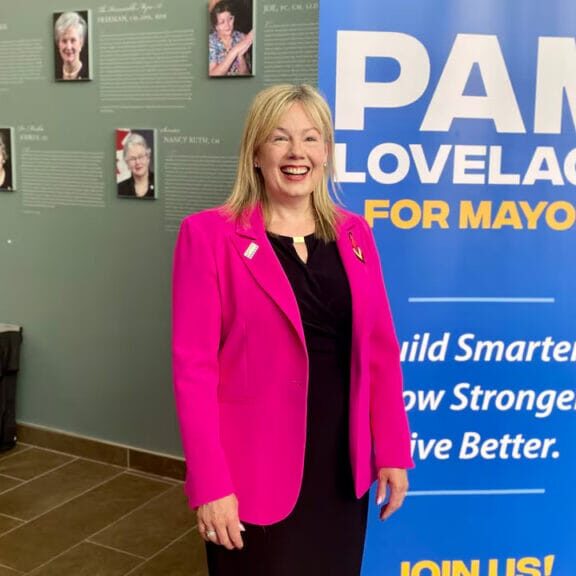
An interview with mayoral candidate Pam Lovelace
Lovelace spoke to the Gazette over the phone about her policies and what students need to know about the upcoming election
The Dalhousie Gazette spoke with mayoral candidate and current District 13 councillor Pam Lovelace. In a phone interview, she answered questions on the issues at the forefront of students and Halifax residents’ minds this election cycle. Election day is October 19.
What should voters know about your political background?
I am a councillor for Halifax Regional Municipality (HRM), a former deputy mayor and I teach local government at Dalhousie University where I modernized a local government course for [the] Faculty of Open Learning & Career Development.
What should voters know about your policy proposals?
I’m advocating for modernization in our taxation system, removing the provincial government off of the property tax bills, both residential and commercial. I’m advocating for the transformation of Halifax transit and creating a capital region transportation commission with budding municipalities who are sending in tens of thousands of single-occupancy vehicles every day and working with the provincial government to create that commission.
The provincial government is on the property tax bill. They take 30 per cent of the property tax bill for residential property taxes and that is all for provincial responsibilities. I’m advocating to remove them. The property tax revenue should not be split with the province. The province already has the highest sales tax [and] one of the highest income taxes in the country. So we need to get the province off our tax bill because we don’t get any of the sales tax or income tax.
Why is it important for students to vote?
It’s so important for students to vote because I hope this city is where they will continue to live and work and potentially have families. I’m excited about ensuring that young people actually recognize that this is their city and the only way to create change is to make their voice heard on election day and to ensure that we are addressing their concerns, whether it’s around affordability, safe streets, helping those who are living unhoused on our streets, ensuring that we work with businesses to expand and create good paying jobs, as well as creating a much more functional transportation system, so it’s affordable for young people to get from one end of the municipality to the other.
How do you propose to support students?
What I’m focused on is providing affordable living. At this point in time, our municipality has become very unaffordable for students and young people to actually live and work in. And with the high rate of unemployment that we’re seeing for young people right now between the ages of 18 and 25, I’m focused on making sure that we have job opportunities and good paying job opportunities for students and young people, so that they can live, work, play and thrive in the HRM.
How do you propose to address the affordability crisis?
The first thing I want to do is get the province off our property tax bill. The second thing is to streamline our development process to make sure that we reduce any time gaps or unnecessary fees in that system so that builders can build quicker and cheaper, and that [the] municipality and [provincial] government [are] cutting the red tape so we’re not adding unnecessary costs. I want to make sure that we’re working with the universities to quicken the process of building student housing that meets the needs of students. We’re looking at more options for housing for students because we know that some are moving here with their families to attend school. They need access to affordable daycare, for example, so that they can complete their studies and have their families here with them. I’m looking forward to sitting down with the student unions and working with student groups to ensure their voices are involved and included in policy development at HRM.
How would you propose to address the tent encampments?
I think what we’ve been doing with the tent encampment in working better with the provincial government is getting us to the point where we’re finally seeing the numbers in tents actually drop, because there’s more housing options and more community housing options for people. In addition to that, we finally have a good system where the intake for individuals is much more streamlined and collaborative with the community service providers who are assisting those folks, and assessing what kind of housing they actually need. I feel like we’re on the right path, but we’ve got to get more smaller homes and shelter homes up and running and at the same time. So while we’ve been working through the administrative aspects of providing opportunities for people to get employed in this sector, we’ve also been working with the community services organizations to help and support them in scaling up and recognizing where the gaps in the system are, so we can fill those gaps.






